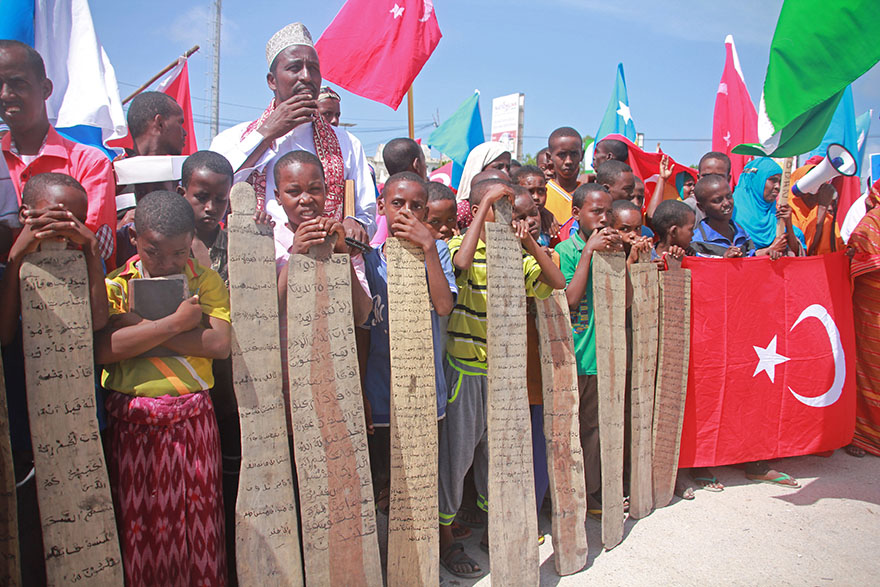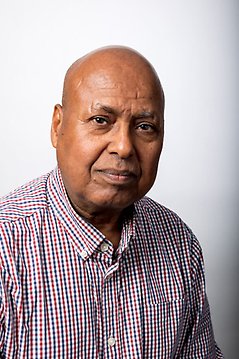How will Turkey’s critical vote impact Africa relations?

Somalis showing support for Turkish president Recep Tayyip Erdoğan in Mogadishu on 16 July 2016. A day before, a faction within the Turkish Armed Forces had attempted a coup d'état in the Turkish capital Ankara against state institutions, including the government and the president. Photo: Farah Abdi Warsameh
Would a post-Erdoğan Turkish government stick to the country’s ambitious, two-decades-old Africa policy? Several factors suggest Ankara will pursue its current push for influence in Africa – with a considerable element of hard power – also under a new regime, researchers say.
Most polls predict a tight race in the 14 May election between incumbent President Recep Tayyip Erdoğan and Kemal Kilicdaroğlu, the candidate of the main opposition alliance. With a power shift in Ankara seeming like a real possibility, African political and business leaders are trying to figure out what post-Erdoğan relations with Turkey might look like.
Under Erdoğan’s leadership, Turkey’s presence in Africa has expanded at a remarkable pace. The number of Turkish embassies has tripled, to 37. Turkish trade with Africa was valued at USD 29 billion in 2021, of which USD 11 billion was with sub-Saharan Africa, an almost eight-fold increase since 2003, according to The Economist magazine. Turkish builders have completed airports, stadiums and mosques in capitals across the African continent.
In Somalia’s capital Mogadishu, the Recep Tayyip Erdoğan Hospital, is the best-equipped medical facility in the country.

Redie Bereketeab. Photo: Mattias Sköld
“In terms of economy and development, Turkey has played a very positive role in Somalia”, says NAI Senior Researcher Redie Bereketeab.
Erdoğan’s visit to Mogadishu in 2011, the first by a non-African leader in two decades, was a watershed moment in Turkey’s engagement with Africa.
“The Turkish president arrived during a period of drought, famine and civil war, accompanied by Turkish businessmen, aid officials and Muslim charities. That massive engagement and substantial support at a very difficult time in the history of Somalia deeply strengthened the relationship between the two countries – not only between statesmen but also on a societal level”, Bereketeab says.
A little over a decade after Erdoğan visit in 2011, Mogadishu is experiencing an economic boom, particularly in the real estate sector.
“After years of crises, Somalia is doing well – at least economically. There is huge economic growth. That Mogadishu now is one of the booming cities of Africa has, at least to some extent, to do with the Turkish investments”, Bereketeab says.
Turkey has deep historical, religious and cultural links with Somalia and the Horn of Africa. The old Somali Ajuran Empire had close trade and military relations with the Ottoman Empire in 16th century, and it is not uncommon for Somalis to have Turkish ancestry.
However, Turkish engagement with Africa of the past two decades goes well beyond the Horn of Africa. In fact, since adopting its “Africa Opening Plan” in 1998, which was only really implemented after Erdoğan’s Justice and Development Party (AKP) took power in 2002, Turkey has engaged broadly with every region on the continent.
“Today’s Turkey-Africa relationship, where engagement with sub-Saharan Africa plays a prominent part, is very new. Unlike old colonial powers such as France, which is occupied with its former colonies, Turkey is open to dealing with any country in search of markets, resources and diplomatic influence. That was the spirit of the Africa Opening Plan”, says Dr Volkan Ipek, assistant professor at Yeditepe University in Turkey.
Turkish interest in Africa started to grow in the 1990s, after decades with little engagement, when Turkey was resuming its geopolitical role after the end of the Cold War. Since Erdoğan’s election win in 2002, Turkey has invested heavily in building soft power in Africa. The Turkish Cooperation and Coordination Agency (TIKA), a state-run aid and technical institution, now has offices in 22 African countries. The Yunus Emre Institute provides Turkish language education and cultural activities in at least ten countries on the continent.
However, in the past few years, the Turkish presence in Africa has developed a hard edge, too.
“There was a turning point around 2020, with the Russian Wagner Group scaling up operations in the Central African Republic. Africa emerged increasingly as a security arena for the world’s major powers – the US, EU and Russia. For Turkey, it meant a shift to realpolitik", Ipek says.
While Turkey’s aim is not to get involved in wars, but rather to sell weapons, it is getting increasingly difficult to maintain the image of a neutral and altruistic partner established during the drought in Somalia in 2011.
Although Turkey lags far behind the major weapons exporters to Africa – China, Russia and the US, sales of military equipment, particularly drones, have become an important source of income for the Turkish government, valued at USD 328 million in 2021, according to figures from the Stockholm International Peace Research Institute. Turkey has engaged in military colaboration with several West African countries, including the education and training of military personnel. It Signed military cooperation agreements with Niger and Nigeria in 2020, with Togo in 2021 and Senegal in 2022.
It is unclear how a win for the Turkish opposition would impact Turkey-Africa relations, Ipek notes. Kilicdaroğlu, who leads a six-party opposition coalition, has promised to roll back the legacy of Erdoğan, but his government would be reluctant to throw away Africa policies that have proven successful in the past.
Kilicdaroğlu’s Republican People’s Party (CHP) was established by the father of the modern Turkish Republic, Mustafa Kemal Atatürk, is still today shaped by Atatürk’s admiration for western civilization, according to Ipek.
“A CHP-led government can be expected to move Turkey closer to the EU, which might consequently give Africa relations less priority,” he says.
However, much depends on who the new foreign minister would be, Ipek says. One of the favourites for the job is Ahmet Davutoğlu, head of the Future Party (GP). He was Erdoğan’s chief advisor when Erdoğan was prime ministerin 2003-2009, and foreign minister in 2009-2014, before falling out with Erdogan. With Davutoğlu again shaping Turkish foreign policy, Africa relations could be expected to continue on the same path as for the past 21 years, Ipek says.
In the end, much of Turkey’s foreign policy – in Africa and elsewhere – depends on the geopolitical environment through which it has to navigate, Ipek says.
“There is a growing competition in Africa for markets and resources, not just from the major powers but from countries like Pakistan and Brazil as well. Then there is the increased securitisation. I think that no matter who wins the election, the Turkish government will continue to see the hard power which has developed in the past few years as a vital part of its presence in Africa.”
TEXT: Mattias Sköld
History of Turkey in Africa
Turkey’s history on the African continent goes back to the 16th century when the Ottomans first arrived in North Africa. Later, Ottoman territory expanded across the shores of the Red and Mediterranean seas and towards the Sahel region. The Ottomans remained a ruling power in Africa for four centuries and established five separate administrations in Algeria, Tunisia, Libya, Egypt and Eritrea. In 1912, Ottoman forces retreated from the continent, leaving its strongholds to European colonial powers. During Turkey’s republican era, the focus shifted to the West.
